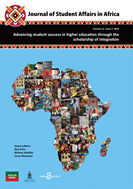“They all offered different support”: Integrated support systems for academic resilience among engineering students
DOI:
https://doi.org/10.24085/jsaa.v12i2.5448Keywords:
Academic resilience, engineering students, holistic student success, interventions, South AfricaAbstract
A critical area of debate in an era of evolving university support systems is student support in challenging disciplines. This study examines the effectiveness of current frameworks in addressing the needs of engineering students. This research employs a mixed-methods approach to identify the experiences of final-year Bachelor of Engineering Technology students, lecturers and support staff at Nelson Mandela University. The study finds a direct relationship between students’ stress levels and their resilience, highlighting the importance of well-structured support systems, including orientation programmes and subject-specific tutoring. This article introduces a novel perspective on fostering academic resilience in engineering education, advocating a comprehensive approach that integrates personal, academic, and socio-ecological aspects of support. Challenging conventional views of interventions for student success, it proposes a new, holistic framework for higher education institutions. This approach could contribute to enhancing student resilience and success and provides a fresh lens to address student dropout in South African higher education and beyond.
Downloads
Published
Issue
Section
License
Copyright (c) 2024 Curwyn Mapaling

This work is licensed under a Creative Commons Attribution-NonCommercial-ShareAlike 4.0 International License.
Authors who publish with this journal agree to the following terms:
Authors retain copyright and grant the journal right of first publication with the work simultaneously licensed under the Creative Commons Attribution Share-alike 4.0 International License that allows others to share the work with an acknowledgement of the work's authorship and initial publication in this journal.
Authors are able to enter into separate, additional contractual arrangements for the non-exclusive distribution of the journal's published version of the work (e.g., post it to an institutional repository or publish it in a book), with an acknowledgement of its initial publication in this journal.
Authors are permitted and encouraged to post their work online (e.g., in institutional repositories or on their website) prior to and during the submission process, as it can lead to productive exchanges, as well as earlier and greater citation of published work (See: The Effect of Open Access).


